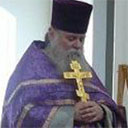We are all familiar with the Lord’s parable of the Pharisee and the Publican, read on the first pre-Lenten Sunday (Luke 18:10-14). Both men in the parable, the Pharisee and the tax collector, approach God in prayer. But the Pharisee begins his prayer by comparing his virtues to those of others: “God, I thank thee that I am not like other men …, or even like this tax collector” (vs. 11). The tax collector, however, pleads for God’s compassion and forgiveness: “O God, have mercy on me a sinner!” (vs. 13) Christ affirms that the tax collector has followed the better way, saying “I tell you, this man went down to his house justified rather than the other” (vs. 14).
A great temptation of our spiritual life is to compare ourselves to others, as the Pharisee did. When we do this we do three things, all of them wrong. In the first place, we turn away from God; He is no longer the focus of our life or the standard to which we compare ourselves. The second error is related to the first: we make ourselves the standard and, in so doing, look only at our virtues. Our third sin is that, if we do turn from ourselves, we look at others rather than turning to God. Moreover, we prejudice our view of them, looking only at their sins.
Christ says of the Pharisee that “he prayed to himself.” If Christ’s Gospel is not the measure of our lives, then no other standard is available except ourselves. When we look only to ourselves as the standard of holiness, we will see mostly our virtues. Or, even worse, we will ascribe to ourselves virtues we do not really have. We will also deceive ourselves about our sins, excusing them or overlooking them entirely. When we truly make God the standard, then we become aware before all else of our sinfulness. We see an example in the Old Testament prophet Isaiah (Isaiah 6: 1-13). He had a vision of the Lord in the temple, and his immediate response was the cry “Woe is me! For I am lost; for I am a man of unclean lips ….” Contrast this with the Pharisee. The only vision he had in the temple was of his own self-righteousness and of the sinfulness of his brother, the tax collector. He failed to notice his own sins, the tax collector’s penitence, and God’s mercy and forgiveness, which was ready to cleanse, to heal, and to accept even tax collectors who repented. Thus, as the Lord points out, the Pharisee went away unjustified, that is, without righteousness.
The tax collector, on the other hand, has a true vision of God. He does not see angels and incense with his physical eyes, like Isaiah, but He beholds God with the eyes of his soul. He sees God’s glory, he recognizes his own transgressions, and he realizes that God is his only hope of forgiveness and another chance at life. God’s glory lies in His compassion; His love is an aspect of His majesty. God’s holiness makes us aware of our sins, but in the same instant, His forgiveness washes them away.
Only in realizing these things can we find repentance, forgiveness, and salvation. The Pharisee thought that he could earn God’s favor by holding up his own good deeds. The tax collector hoped that he could find cleansing and new life by relying on God’s forgiveness and love. The tax collector’s way won Christ’s praise. May it always also be our way.
***


